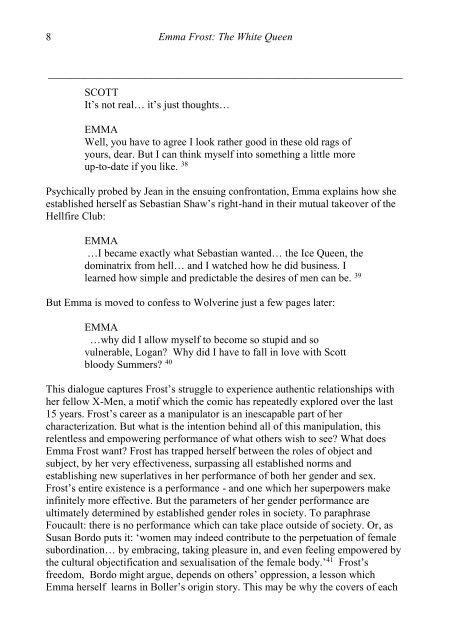Create successful ePaper yourself
Turn your PDF publications into a flip-book with our unique Google optimized e-Paper software.
8<br />
Emma Frost: The White Queen<br />
__________________________________________________________________<br />
SCOTT<br />
It’s not real… it’s just thoughts…<br />
EMMA<br />
Well, you have to agree I look rather good in these old rags of<br />
yours, dear. But I can think myself into something a little more<br />
up-to-date if you like. 38<br />
Psychically probed by Jean in the ensuing confrontation, Emma explains how she<br />
established herself as Sebastian Shaw’s right-hand in their mutual takeover of the<br />
Hellfire Club:<br />
EMMA<br />
…I became exactly what Sebastian wanted… the Ice Queen, the<br />
dominatrix from hell… and I watched how he did business. I<br />
learned how simple and predictable the desires of men can be. 39<br />
But Emma is moved to confess to Wolverine just a few pages later:<br />
EMMA<br />
…why did I allow myself to become so stupid and so<br />
vulnerable, Logan? Why did I have to fall in love with Scott<br />
bloody Summers? 40<br />
This dialogue captures Frost’s struggle to experience authentic relationships with<br />
her fellow X-Men, a motif which the comic has repeatedly explored over the last<br />
15 years. Frost’s career as a manipulator is an inescapable part of her<br />
characterization. But what is the intention behind all of this manipulation, this<br />
relentless and empowering performance of what others wish to see? What does<br />
Emma Frost want? Frost has trapped herself between the roles of object and<br />
subject, by her very effectiveness, surpassing all established norms and<br />
establishing new superlatives in her performance of both her gender and sex.<br />
Frost’s entire existence is a performance - and one which her superpowers make<br />
infinitely more effective. But the parameters of her gender performance are<br />
ultimately determined by established gender roles in society. To paraphrase<br />
Foucault: there is no performance which can take place outside of society. Or, as<br />
Susan Bordo puts it: ‘women may indeed contribute to the perpetuation of female<br />
subordination… by embracing, taking pleasure in, and even feeling empowered by<br />
the cultural objectification and sexualisation of the female body.’ 41 Frost’s<br />
freedom, Bordo might argue, depends on others’ oppression, a lesson which<br />
Emma herself learns in Boller’s origin story. This may be why the covers of each


